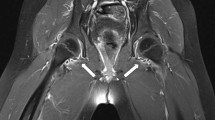Abstract
Rituximab (RTX) is effective for treating childhood refractory nephrotic syndrome (NS), such as steroid-dependent (SD), frequently relapsing (FR), and steroid-resistant (SR) NS. While RTX has been proven to be effective in treating SDNS, FRNS, and SRNS, it may cause serum sickness, a rare illness characterized by fever, rash, and arthralgia, 10–14 days after primary antigen exposure or within a few days after secondary antigen exposure, by producing human anti-chimeric antibodies (HACAs). A 17-year-old girl with refractory SDNS treated with RTX and oral cyclosporine A was admitted with fever and arthralgia 10 days after the fifth RTX dose was administered. After RTX was started when she was 14-years-old, SDNS remission was then achieved, and prednisolone was discontinued. Although antibiotics and non-steroidal anti-inflammatory agents were administered, fever and arthralgia continued. After various inspections and clinical course, we considered her as RTX-induced serum sickness (RISS). The patient had an elevated HACA level and was diagnosed with RISS. Fever and arthralgia disappeared 5 days after onset. To the best of our knowledge, this is the first reported case of RISS with NS. Fever, rash, and arthralgia after RTX administration can be the initial symptoms.

Similar content being viewed by others
References
Kamei K, Ogura M, Sato M, Sako M, Iijima K, Ito S. Risk factors for relapse and long-term outcome in steroid-dependent nephrotic syndrome treated with rituximab. Pediatr Nephrol. 2016;31:89–95.
Benz K, Dotsch J, Rascher W, Stachel D. Change of the course of steroid-dependent nephrotic syndrome after rituximab therapy. Pediatr Nephrol. 2004;19:794–7.
Nozu K, Iijima K, Fujisawa M, Nakagawa A, Yoshikawa N, Matsuo M. Rituximab treatment for posttransplant lymphoproliferative disorder (PTLD) induces complete remission of recurrent nephrotic syndrome. Pediatr Nephrol. 2005;20:1660–3.
Iijima K, Sako M, Nozu K, Mori R, Tuchida N, Kamei K, Miura K, Aya K, Nakanishi K, Ohtomo Y, Takahashi S, Tanaka R, Kaito H, Nakamura H, Ishikura K, Ito S, Ohashi Y, Rituximab for Childhood-onset Refractory Nephrotic Syndrome (RCRNS) Study Group. Rituximab for childhood-onset, complicated, frequently relapsing nephrotic syndrome or steroid-dependent nephrotic syndrome: a multicentre, double-blind, randomised, placebo-controlled trial. Lancet. 2014;384:1273–81.
Ito S, Kamei K, Ogura M, Udagawa T, Fujinaga S, Saito M, Sako M, Iijima K. Survey of rituximab treatment for childhood-onset refractory nephrotic syndrome. Pediatr Nephrol. 2013;28:257–64.
Chung CH. Managing premedications and the risk for reactions to infusional monoclonal antibody therapy. Oncologist. 2008;13:725–32.
US National Library of Medicine. DailyMed. https://dailymed.nlm.nih.gov/dailymed/index.cfm Accessed 4 July 2017.
D’Arcy CA, Mannik M. Serum sickness secondary to treatment with the murine-human chimeric antibody IDEC-C2B8 (rituximab). Arthritis Rheum. 2001;44:1717–8.
Karmacharya P, Poudel D, Pathak R, Donato A, Ghimire S, Giri S, Aryal M, Bingham C. Rituximab-induced serum sickness: a systematic review. Semin Arthritis Rheum. 2015;45:334–40.
Finger E, Scheinberg M. Development of serum sickness-like symptoms after rituximab infusion in two patients with severe hypergammaglobulinemia. J Clin Rheumatol. 2007;13:94–5.
Looney RJ, Anolik JH, Campbell D, Felgar RE, Young F, Arend LJ, Sloand JA, Rosenblatt J, Sanz I. B cell depletion as a novel treatment for systemic lupus erythematosus: a phase I/II dose-escalation trial of rituximab. Arthritis Rheum. 2004;50:2580–9.
Goto S, Goto H, Tanoshima R, Kato H, Takahashi H, Sekiguchi O, Kai S. Serum sickness with an elevated level of human anti-chimeric antibody following treatment with rituximab in a child with chronic immune thrombocytopenic purpura. Int J Hematol. 2009;89:305–9.
Ahn YH, Kang HG, Lee JM, Choi HJ, Ha IS, Cheong HI. Development of antirituximab antibodies in children with nephrotic syndrome. Pediatr Nephrol. 2014;29:1461–4.
Author information
Authors and Affiliations
Corresponding author
Ethics declarations
Conflict of interest
All the authors have declared that no conflict of interest exists.
Human and animal rights statement
This article does not contain any studies with human participants or animals performed by any of the authors.
Informed consent
Informed consent was obtained from all individual participants included in the study.
About this article
Cite this article
Maeda, R., Kawasaki, Y., Ohara, S. et al. Serum sickness with refractory nephrotic syndrome following treatment with rituximab. CEN Case Rep 7, 69–72 (2018). https://doi.org/10.1007/s13730-017-0297-7
Received:
Accepted:
Published:
Issue Date:
DOI: https://doi.org/10.1007/s13730-017-0297-7




